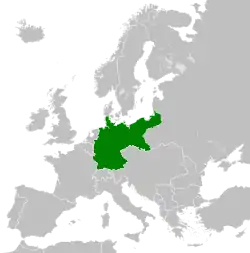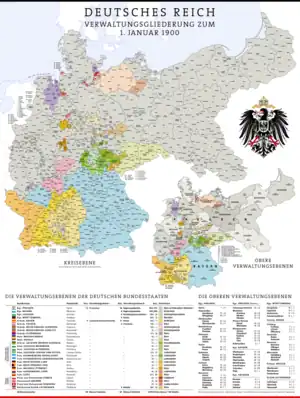German Empire
The German Empire or Germany ("Deutsches Reich" or "Deutsches Kaiserreich"or Deutschland in the German language) is the name for a group of German countries from January 18, 1871 to November 9, 1918. This is from the Unification of Germany when Wilhelm I of Prussia was made German Kaiser to when the third Emperor Wilhelm II was removed from power at the end of the First World War. In the 1920s, German nationalists started to call it the "Second Reich".
German Empire Deutsches Kaiserreich | |||||||||
|---|---|---|---|---|---|---|---|---|---|
| 1871–1918 | |||||||||
| Motto: Gott mit Uns (German: "God with us”) | |||||||||
| Anthem: Heil dir im Siegerkranz (unofficial) | |||||||||
 The German Empire in 1914 | |||||||||
| Status | Empire | ||||||||
| Capital | Berlin 52°31′N 13°24′E | ||||||||
| Common languages | German Polish (Posen, Upper Silesia, Masuria) French (Lothringen region of Elsass-Lothringen) | ||||||||
| Government | Constitutional monarchy | ||||||||
| Emperor | |||||||||
• 1871-1888 | Wilhelm I | ||||||||
• 1888-1888 | Friedrich | ||||||||
• 1888-1918 | Wilhelm II | ||||||||
| Chancellor | |||||||||
• 1871-1890 | Otto von Bismarck | ||||||||
• 3 Oct-9 Nov 1918 | Max von Baden | ||||||||
| History | |||||||||
• Victory in the Franco-Prussian War | January 18 1871 | ||||||||
• Proclamation of the Weimar Republic | November 9 1918 | ||||||||
| Area | |||||||||
| 1910 | 540,766 km2 (208,791 sq mi) | ||||||||
| Population | |||||||||
• 1871 | 41058792 | ||||||||
• 1890 | 49428470 | ||||||||
• 1910 | 64925993 | ||||||||
| Currency | Goldmark | ||||||||
| ISO 3166 code | DE | ||||||||
| |||||||||
The name of Germany was "Deutsches Reich" until 1945. "Reich" can mean many things, empire, kingdom, state, "richness" or "wealth". Most members of the Empire were previously members of the North German Confederation.
At different times, there were three groups of smaller countries, each group was later called a "Reich" by some Germans. The first was the Holy Roman Empire. The second was the German Empire. The third was the Third Reich.
The words "Second Reich" were used for the German Empire by Arthur Moeller van den Bruck, a nationalist writer in the 1920s. He was trying to make a link with the earlier Holy Roman Empire which had once been very strong. Germany had lost First World War and was suffering big problems. van den Bruck wanted to start a "Third Reich" to unite the country. These words were later used by the Nazis to make themselves appear stronger.
States in the Empire

| State | Capital | |
|---|---|---|
| Kingdoms (Königreiche) | ||
| Prussia (Preußen) | Berlin | |
| Bavaria (Bayern) | Munich | |
| Saxony (Sachsen) | Dresden | |
| Württemberg | Stuttgart | |
| Grand duchies (Großherzogtümer) | ||
| Baden | Karlsruhe | |
| Hesse (Hessen) | Darmstadt | |
| Mecklenburg-Schwerin | Schwerin | |
| Mecklenburg-Strelitz | Neustrelitz | |
| Oldenburg | Oldenburg | |
| Saxe-Weimar-Eisenach (Sachsen-Weimar-Eisenach) | Weimar | |
| Duchies (Herzogtümer) | ||
| Anhalt | Dessau | |
| Brunswick (Braunschweig) | Braunschweig | |
| Saxe-Altenburg (Sachsen-Altenburg) | Altenburg | |
| Saxe-Coburg and Gotha (Sachsen-Coburg und Gotha) | Coburg | |
| Saxe-Meiningen (Sachsen-Meiningen) | Meiningen | |
| Principalities (Fürstentümer) | ||
| Lippe | Detmold | |
| Reuss, junior line | Gera | |
| Reuss, senior line | Greiz | |
| Schaumburg-Lippe | Bückeburg | |
| Schwarzburg-Rudolstadt | Rudolstadt | |
| Schwarzburg-Sondershausen | Sondershausen | |
| Waldeck-Pyrmont | Arolsen | |
| Free Hanseatic cities (Freie Hansestädte) | ||
| Bremen | ||
| Hamburg | ||
| Lübeck | ||
| Imperial territory (Reichsland) | ||
| Alsace-Lorraine (Elsaß-Lothringen) | Straßburg | |
Related pages
- Germany
- Holy Roman Empire
- Nazi Germany, or "Drittes Reich"
.svg.png.webp)
